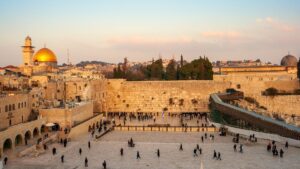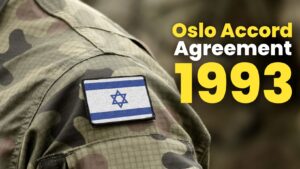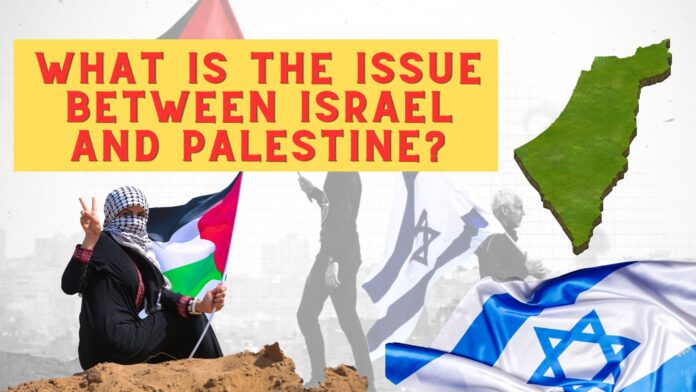Introduction:What is the issue between Israel and Palestine?
The conflict between Israel and Palestine dates back to the fall of the Ottoman Empire. During this period, the widespread influence of nationalism was being seen throughout Israel and Palestine are two countries whose dispute has been going on for a long time. Many agreements were made to establish peace and end differences between the two countries, but the outcome was nothing special. Today, through this article, we will tell you about all the reasons due to which the dispute between these two countries increased day by day.
Historical Background: What is the issue between Israel and Palestine?

The Israel-Palestine conflict has a profound historical background, with its origins reaching back to the late 19th and early 20th centuries. During this period, both Jewish and Arab communities asserted claims to the land, historically recognized as Palestine. This competition for territorial rights set the stage for the complex and enduring conflict that continues to impact the region today.
About Israel-palestine
Many countries were divided into pieces. The wave of nationalism was uniting them. Countries like Italy and Germany were uniting in the name of nationalism. Its influence was also seen among the Jews. The feeling of nationalism also arose among the Jewish people. He felt a longing to go back and settle in his holy place.
This is where the Zionist movement begins. In the 19th century, this holy land of the Jews was known as Palestine. During this period, Jews were scattered throughout Europe. They were exploited a lot in Europe. During the Zionist movement, initially there was a small-scale migration of Jews towards Palestine. After this comes the tour of the First World War. The Balfour Declaration came in 1917
Balfour declaration

In 1917, during World War I, the Ottoman Empire was on the verge of defeat. At that time Britain’s Foreign Minister Sir Arthur Balfour issued a declaration. In this declaration it was indicated that Britain would give the Jews their holy land Palestine and get them resettled there. On the other hand, Britain secretly signed the Sykes-Picot Agreement with France and Russia.
Under this, he divided the entire Middle East into different parts and decided which country would go to whose part after the end of the First World War. In this he kept Palestine in his share. Syria and Jordan were given to France. Some part of Türkiye went to Russia. On one hand, Britain collectively said that we would give Palestine to the Jews. On the other hand, he secretly kept this share with himself under the Sykes-Pico Agreement.
After the end of World War I
After the end of World War I, the Ottoman Empire was defeated. The British Mandate in Palestine begins. Due to the Balfour Declaration, a large number of Jews were migrating to Palestine. During this period, the number of Jews here started increasing rapidly. The Jews who were migrating to Palestine, came here and started buying land. Gradually the Jews started expanding in Palestine. Now the Jews have increased the rate of purchasing land from Arab Palestinians even more than before. Jews began expanding extensively in Palestine.
After strengthening their dominance in Palestine, they started exterminating the Arab Palestinians. Due to this, Arab Palestinians revolted in 1936. To suppress it, the British government took the help of the Jewish army. Later, to pacify Arab Palestinians, the British government imposed many restrictions on Jewish migration. Due to this, the Jewish people turned against the British government and started secretly carrying out guerrilla attacks on them
Immediately after this decision of the UN, the neighboring countries of the newly created Israel (Egypt, Syria, Iraq and Jordan) attacked it. In this war, Israel defended itself and defeated these four countries. After this battle, Jordan gained control of the entire West Bank of Palestine. Whereas Egypt’s on Gaza Strip. There was a small area of Palestine, which was captured by Israel. Due to this war the existence of Palestine became non-existent. In the war, Israel had captured fifty percent of Palestine. Due to this war, about seven lakh Arab Palestinians had to leave their country as refugees.
1967 war
Egypt, Syria, and Jordan plan to attack Israel again in 1967, following the Arab–Israeli War. Even before their attack, Israel attacked these three countries. All three countries suffered huge losses in the attack. In this war, Israel captured Golan Heights from Syria, Gaza Strip and Sinai Peninsula from Egypt and the West Bank from Jordan.
Later, due to some international agreements, Israel had to return the Sinai Peninsula to Egypt. On the other hand, Israel had the entire Palestine under its control. This war is known as the Six-Day War.

Oslo Accord Agreement 1993
Israel had complete control over Palestine. After this, Palestinians start speaking against the increasing Israeli militarization and oppressive policies on the West Bank. In this series, Yasser Arafat started an organization named Palestine Liberation Organization. This organization carried out several sporadic bombings and attacked Israeli embassies abroad. Many Israeli planes were hijacked. During this period, violence started increasing in this country. After that comes a period of great transformation
Oslo Accord is signed in 1993 to establish peace between the two countries. In this it was decided that Palestine would accept Israel as an international country. On the other hand, Israel considered the PLO as the representative of the Palestinian people. In this agreement it was also decided that the Palestinian government would democratically control the West Bank and Gaza Strip. The Nobel Peace Prize was also given to Israel’s Yitz Stock Raben and Palestine’s Yasser Arafat for this agreement.
Conclusion
Renewed Diplomacy:
Encourage both Israeli and Palestinian leadership to re-engage in meaningful diplomatic negotiations.
Facilitate international mediation to promote dialogue and bridge gaps between the two parties.
Two-State Solution:
Advocate for a two-state solution as a framework for addressing territorial and political concerns.
Ensure that both Israel and Palestine can coexist as independent and sovereign states with agreed-upon borders.
Humanitarian Measures:
Implement humanitarian initiatives to address the immediate needs of affected populations, particularly in Gaza and other conflict-affected areas.
Facilitate access to essential services and improve living conditions for Palestinians.
Security Cooperation:
Enhance security cooperation between Israel and Palestine to foster trust and stability in the region.
Collaborate on measures to counter extremism and ensure the safety of both Israeli and Palestinian citizens.
Regional Engagement:
Involve neighboring countries and regional powers in supporting the peace process.
Seek collective efforts to address broader regional challenges that may impact the Israel-Palestine conflict.
Economic Development:
Promote economic development initiatives to create opportunities and improve livelihoods for people in the region.
Encourage investments that contribute to sustainable growth and prosperity.
Educational and Cultural Initiatives:
Implement educational programs that foster understanding and tolerance between Israeli and Palestinian communities.
Promote cultural exchanges to build bridges and break down stereotypes.
International Support:
Rally international support for a comprehensive and just resolution to the conflict.
Encourage the involvement of the United Nations and other relevant organizations in facilitating the peace process.
Commitment to Peace:
Emphasize the importance of a sustained commitment to peace from all parties involved.
Foster a climate where trust can be rebuilt through confidence-building measures.
Review and Adjust:
Regularly review progress and adjust strategies as needed based on evolving circumstances.
Remain open to diplomatic flexibility and creative solutions to overcome challenges.

